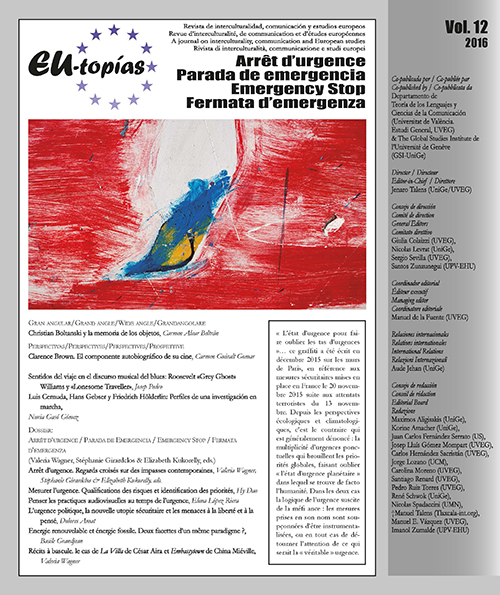Sens du voyage dans le discours musical du blues: Roosevelt “Grey Ghost” Williams et “Lonesome Traveller”
DOI :
https://doi.org/10.7203/eutopias.0.18639Mots-clés :
Discours musical, blues, voyage, hobo, culture afro-americaine, Grey Ghost Résumé
Résumé
Dans une perspective communicative, socio-sémiologique et ethnomusicologique, l’objectif de cet article est d’étudier la construction du sens du voyage et le mode de vie itinérant (hobo) dans le discours musical du blues. Nous allons d’abord faire une contextualisation historique du voyage dans la tradition afro-américaine, puis nous allons analyser le cas du légendaire musicien du Texas Roosevelt «Grey Ghost» Williams et sa chanson «Lonesome Traveller» («voyageur solitaire»), dans laquelle sont représentés le sujet et le style de vie hobo (travailleur migrant et sans-abri). Dans le processus, nous allons discuter le sens du voyage comme imposition et le sens du voyage comme signe d’indépendance et de liberté, affirmant la complémentarité entre les deux.
 Téléchargements
Téléchargements
 Références
Références
Arnold, Kathleen R. (2004), Homelessness, Citizeship and Identity. The Uncanniness of Late Modernity, Nueva York: State University Press of New York.
Cushing, Steve (2010), Blues before Sunrise. The Radio Interviews, Illinois: University of Illinois.
Davis, Angela (1998), Blues Legacies and Black Feminism, Nueva York: Vintage Books.
DeVeaux, Scott (1997), The Birth of Bebop. A Social and Musical History, Berkeley: University of California Press.
Ellison, Ralph (1995), Shadow and Act, Nueva York: Vintage International.
García Canclini, Néstor (2009), Culturas Híbridas. Estrategias Para Entrar y Salir de la Modernidad, México: Randon House.
Hooper, Dave (1996), «End of the Line: The Passing of Grey Ghost», Austin Chronicle, 26 de julio [http://www.austinchronicle.com/music/1996-07-26/532322/, consultado el 30/03/2015].
Lawson. R. A. (2013), Jim Crow’s Counterculture: The Blues and Black Southerners, 1890-1945, Louisiana: Louisiana State University Press.
London, Jack (1907), The Road, Nueva York: Macmillan.
McLeese, Don (1992), «Ghost’s music haunts Texas blues», Austin American-Statesman, 15 de octubre, p.5.
Oliver, Paul (1990), Blues Fell This Morning. Meaning in the Blues, Cambridge: Cambridge University Press.
Owens, Tary y Hardwig, Jay (1999), «Every Goodbye Ain’t Gone: The Life and Times of the Grey Ghost», texto inédito, consultado en Dolph Briscoe Center for American History.
Owens, Tary (1987), «R.T. Williams Biographical Material», texto inédito, consultado en Dolph Briscoe Center for American History.
Owens, William (1993), Tell Me a Story, Sing Me a Song: A Texas Chronicle. Austin: University of Texas Press.
Pedro, Josep (2016), «The Globalization of Blues: Rural, Urban, Transatlantic», Brian Goss, Mary Gould y Joan Pedro-Carañana (eds.), Talking Back To Globalization: Texts and Practices, Nueva York: Peter Lang.
Steinberg, R.U. (1989), «The Grey Ghost», Living Blues, noviembre/diciembre, pp. 22-24.
Sullivan, Ruth K. (2009), «Tary Owens, Texas Folklorist and Musician: A Life Remembered», Journal of Texas Music History, 9, no. 1, pp. 8-35.
Sullivan, Ruth (2013), «Williams, Roosevelt Thomas [Grey Ghost]», Handbook of Texas Online [https://www.tshaonline.org/handbook/online/articles/fwibe, consultado el 19/04/2015].
Téléchargements
Publiée
Comment citer
-
Résumé148
-
PDF (Español)71
Numéro
Rubrique
Licence
![]()
Tous les contenus publiés dans EU-topías. Revista de Interculturalidad, Comunicación y Estudios Europeos est sous licence Creative Commons Paternité-Pas d'Utilisation Commerciale-Partage des Conditions Initiales à l'Identique 4.0. Le texte complet de la licence peut être trouvé à http://creativecommons.org/licenses/by-nc-sa/4.0
Ils peuvent être copiés, utilisés, diffusés, transmis et affichés publiquement, à condition que:
- L'auteur et la source originale de la publication sont cités (magazine, éditeur et URL de l'œuvre).
- Ils ne sont pas utilisés à des fins commerciales.
- L'existence et les spécifications de cette licence d'utilisation sont mentionnées



